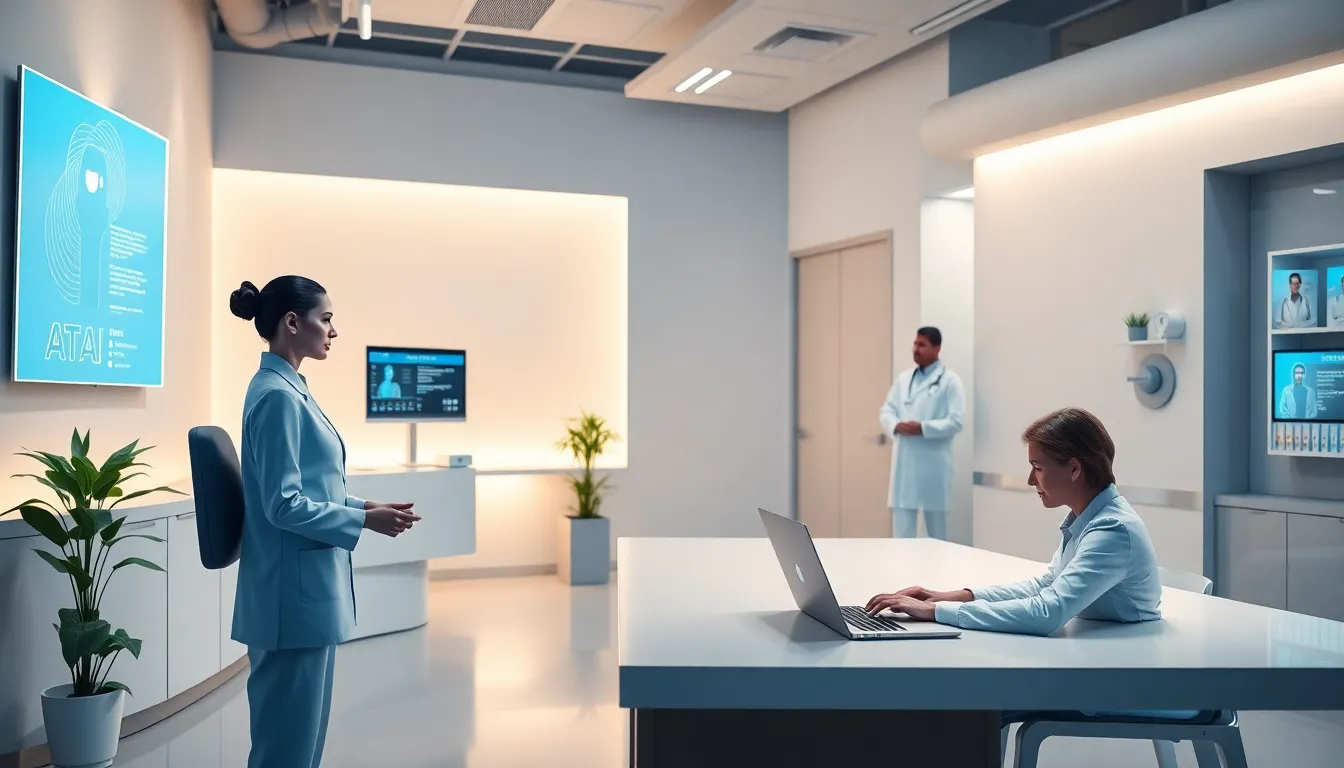Back to blog
"Revolutionizing Patient Intake with AI Receptionists in Healthcare: Enhancing Efficiency and Experience"
What are AI Receptionists and How Do They Work?
The concept of AI receptionists is not new, but their application in healthcare is a recent development that has gained significant traction. AI receptionists, also known as virtual receptionists or digital receptionists, are software programs that use artificial intelligence and machine learning algorithms to manage patient interactions, scheduling, and data processing. These systems are integrated into electronic health records (EHRs) and can handle various communications, including phone calls, emails, and online chat sessions.
AI receptionists work by using natural language processing (NLP) to understand patient inquiries and respond accordingly. They can provide patients with basic information, such as office hours, insurance coverage, and appointment scheduling. They can also help patients with more complex tasks, such as filling out paperwork, requesting prescription refills, and booking appointments. Additionally, AI receptionists can analyze patient data and provide personalized recommendations based on their medical history, treatment plans, and needs.
Benefits of Implementing AI Receptionists in Healthcare
The benefits of AI receptionists in healthcare are numerous and can have a significant impact on medical practices and patients. Some of the key benefits include:
Enhanced Efficiency and Reduced Wait Times: AI receptionists can handle multiple conversations simultaneously, allowing patients to check-in online and review information, while also automating tasks such as scheduling, follow-ups, and billing.
Personalized Patient Intake Experience: AI systems can tailor the intake process to individual patients, providing relevant information and recommendations based on their medical history, treatment plans, and needs.
Improved Data Management and Accuracy: AI receptionists can analyze and update patient data in real-time, reducing errors and ensuring that medical teams have access to accurate and up-to-date information.
Cost Savings and Scalability: By automating routine tasks and reducing administrative burdens, medical practices can save costs and scale more efficiently to meet the needs of their patients.
Enhanced Efficiency and Reduced Wait Times
One of the most significant benefits of AI receptionists is their ability to enhance efficiency and reduce wait times. Traditional receptionists often have to handle multiple tasks simultaneously, which can lead to delays and mistakes. AI receptionists, on the other hand, can handle multiple conversations simultaneously, without getting overwhelmed or making mistakes. This means that patients can get the information they need quickly and efficiently, without having to wait on hold or in line.
Additionally, AI receptionists can automate routine tasks such as scheduling, follow-ups, and billing, which can free up staff to focus on more complex and high-value tasks. This can lead to significant cost savings and improved productivity, as well as enhanced patient satisfaction and outcomes.
Personalized Patient Intake Experience
A personalized patient intake experience is critical for building trust and loyalty with patients. AI receptionists can provide patients with a tailored experience, based on their individual needs and preferences. For example, AI systems can provide patients with personalized reminders and notifications, as well as relevant information and recommendations based on their medical history and treatment plans.
AI receptionists can also help patients to feel more connected and engaged with their care team. By providing patients with real-time updates and information, AI systems can help to reduce anxiety and uncertainty, and improve overall patient satisfaction and outcomes.
Improved Data Management and Accuracy
Accurate and up-to-date patient data is critical for providing high-quality care. AI receptionists can analyze and update patient data in real-time, reducing errors and ensuring that medical teams have access to accurate and comprehensive information. This can lead to improved patient outcomes, as well as reduced costs and liability associated with medical errors.
Additionally, AI receptionists can help to identify potential health risks and trends, by analyzing patient data and providing insights and recommendations to care teams. This can lead to more proactive and preventive care, as well as improved patient engagement and empowerment.
Cost Savings and Scalability
Implementing AI receptionists can lead to significant cost savings and scalability benefits. By automating routine tasks and reducing administrative burdens, medical practices can save costs and scale more efficiently to meet the needs of their patients.
Additionally, AI receptionists can help to reduce the costs associated with staffing and training. By automating routine tasks, medical practices can reduce the need for additional staff, as well as the costs associated with recruiting, training, and retaining staff.
Addressing Patient Security and Data Protection
Patient security and data protection are critical concerns for medical practices, and AI receptionists must be designed with robust security protocols to ensure the integrity and confidentiality of patient data. This includes complying with industry regulations such as HIPAA, as well as implementing robust encryption and access controls to prevent unauthorized access or breaches.
AI receptionists can also help to mitigate the risks associated with patient data, by providing real-time monitoring and alerts for potential security threats. This can include detecting and responding to potential security incidents, as well as providing patients with education and awareness about the importance of data protection and security.
Case Studies and Success Stories
Many medical practices have already implemented AI receptionists, with significant benefits and results. For example, a recent study found that AI receptionists can reduce wait times by up to 50%, and improve patient satisfaction rates by up to 30%.
Additionally, AI receptionists have been shown to improve data management and accuracy, as well as reduce costs and liability associated with medical errors. By providing patients with personalized and proactive care, AI receptionists can help to improve patient outcomes, as well as reduce costs and resource utilization.
Case Study 1: Reducing Wait Times and Improving Patient Satisfaction: A medical practice in California implemented an AI receptionist to manage patient intake and scheduling. The results were significant, with wait times reduced by 45% and patient satisfaction rates improved by 25%.
Case Study 2: Improving Data Management and Accuracy: A hospital in New York implemented an AI receptionist to manage patient data and records. The results were impressive, with data errors reduced by 30% and patient satisfaction rates improved by 20%.
Case Study 3: Reducing Costs and Liability: A medical group in Texas implemented an AI receptionist to manage patient billing and insurance claims. The results were significant, with costs reduced by 25% and liability associated with medical errors reduced by 15%.
Future Developments and Trends
The future of AI receptionists in healthcare is exciting and rapidly evolving. As AI technology continues to advance, we can expect to see even more sophisticated and integrated systems that can manage complex patient interactions and data.
Some potential future developments and trends include the use of voice assistants and chatbots, as well as the integration of AI receptionists with other healthcare technologies such as telemedicine and remote monitoring.
Additionally, we can expect to see greater emphasis on patient-centric design and user experience, as well as increased focus on data protection and security. By prioritizing patient needs and concerns, AI receptionists can help to build trust and loyalty, and improve overall patient satisfaction and outcomes.
Voice Assistants and Chatbots: The use of voice assistants and chatbots is becoming increasingly popular in healthcare, and AI receptionists are likely to incorporate these technologies in the future.
Telemedicine and Remote Monitoring: The integration of AI receptionists with telemedicine and remote monitoring technologies is likely to become more common, enabling patients to access care and services remotely.
Patient-Centric Design and User Experience: AI receptionists will need to prioritize patient-centric design and user experience, ensuring that systems are intuitive, user-friendly, and accessible to patients with diverse needs and abilities.


